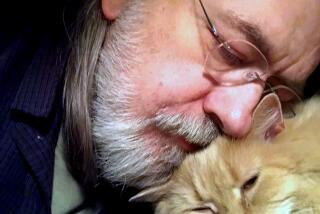In Memory of Paul Monette
Paul Monette died last week after a valiant struggle with AIDS. He will be remembered by the reading and writing public for changing the way we thought about AIDS and about being gay and lesbian. He will also be remembered as a courageous writer who took heart from his talent and redeemed catastrophe in the way that artists can. For from Monette’s writing we learn that the worst that life can bring can be transformed into lasting writing, full of feeling and experience and wisdom. AIDS neither victimized nor defeated Monette; it was the occasion of the making of a powerful American voice.
Monette’s “Borrowed Time: An AIDS Memoir” (1988) chronicled his lover Roger Horwitz’s battle with AIDS. It was the first book of its kind and has lost none of its wrenching, honest power. It is too easy to forget how important “Borrowed Time” was, how many truths it told that had been suppressed and how much we take for granted that Monette was the first to write. Monette wrote about how AIDS disrupted what had been the happy lives of two talented and successful gay men, relatively privileged in a society that has little use for its largest sexual minority. He humanized the experience of a plague that was still treated as a cause of unspeakable shame, rather than as a sickness.
What made “Borrowed Time” startling, however, was the candor with which Monette told his own and Horwitz’s story. He wrote the anguish, the fear, the swings of mood and the frustration; about the friends and doctors and nurses who sustained them, and those who did not. Who could forget the first words of this book:
“I don’t know if I will live to finish this. Doubtless there’s a streak of self-importance in such an assertion, but who’s counting? Maybe it’s just that I’ve watched too many sicken in a month and die by Christmas, so that a fatal sort of realism comforts me more than magic. All I know is this: The virus ticks in me. And it doesn’t care a whit about our categories--when isfull blown, what’s AIDS-related, what is just sick and tired. . . . I used up all my optimism keeping my friend alive. Now that he’s gone, the cup of my own health is neither half full nor half empty. Just half.”
Before AIDS Monette was a good writer. His experiences with AIDS, however, transformed his writing in an extraordinary way. He lived to finish several more books, and in the process of that writing, he challenged himself and his readers with the truths that come from feelings and experiences.
In the years that followed “Borrowed Time,” Monette lived with HIV and then with AIDS and wrote about it. He met and buried a second lover, Stephen Kolzak, and then happily met Winston Wilde, who survives him. He became, through his writing and through his public activity, a visible and inspiring spokesman for people with AIDS. He also became a leader of his tribe, as he liked to say, a hero to gay men and lesbians who saw in the mirror of his writing a powerful reflection of ourselves and our experience. He gave generously of himself and he kept on writing.
That writing took many forms. Monette published two novels, “Afterlife” and “Halfway Home,” that told the stories of AIDS widowers and activists, family and love. They make a striking contrast to his earlier, lighter novels in their determination to mine the real and tell the most direct truth possible about what even stricken people can rescue from life. Like all of Monette’s writing, they profit from his sentence-to-sentence craft and his appetite for dish as well as despair, for joy as well as anger.
Monette’s poetry underwent a similar transformation. A well-trained, aesthetically inclined poet, Monette responded to his loss and to the horrors of AIDS with an astonishing series of poems, collected in “Love Alone: 18 Elegies for Rog” and “No Witnesses, West of Yesterday, East of Summer.” These poems are utterly unlike his earlier verse. They address the world with unsettling emotion, by turns angry, grieving, passionate and loving--stunned rather than crafted into expression. Their poet cries out in a wilderness of human making, naming and flaying his enemies and his tribe’s tormentors; they are quasi-prophetic, bardic and political, a seeming stream of invective and pained consciousness. To hear Monette read was an unforgettable experience, and these poems, raw and contemptuous of nicety, bear witness to the core of the experience of AIDS.
Transformation must be the hallmark of Monette’s prodigious last decade of writing. His prose sustained him in an unthinkable time of loss and struggle. His essays and interviews show a man determined to see things clear and tell them true. “Last Watch of the Night: Essays Too Personal and Otherwise” collects these documents of our time and present a kind of autobiography of the experience of a writer who received the acclaim at last which he deserved and must have wanted. The occasion of his fame, however, was the result of something not worth it. It is a tribute to Monette’s spirit that he neither rejected the success of his writing nor allowed it turn his head from the truths he was driven to record. The loss of others and then the onslaught of his own AIDS did not stay his writing hand. He wrote to the end with all the resources of a keen spirit, a writer’s discipline and a sense of the importance of his own experience to others.
It can be fairly argued what of his work was the most important or will be the most lasting. Surely, his record of what AIDS means to those it visits is permanent. But equally staying is the way in which Monette’s vigil led him to a deep community with his own. His autobiography, “Becoming a Man: Half a Life Story” (1992), which won the National Book Award, remains for many of us his single most important gift. It is the ultimate coming out story, that genre so central to gay and lesbian literature. In it, Monette went back over his own life as a gay boy growing up with a secret, the secret of his own nature, and how that secret was changed from a lock on his closet door to the key to his life. Something in his own embittering and terrible experience with AIDS brought Paul Monette to the shared truths that lesbians and gay men struggle with in their own lives. He championed our lives even as he was fighting to save his own.
More to Read
Sign up for our Book Club newsletter
Get the latest news, events and more from the Los Angeles Times Book Club, and help us get L.A. reading and talking.
You may occasionally receive promotional content from the Los Angeles Times.






